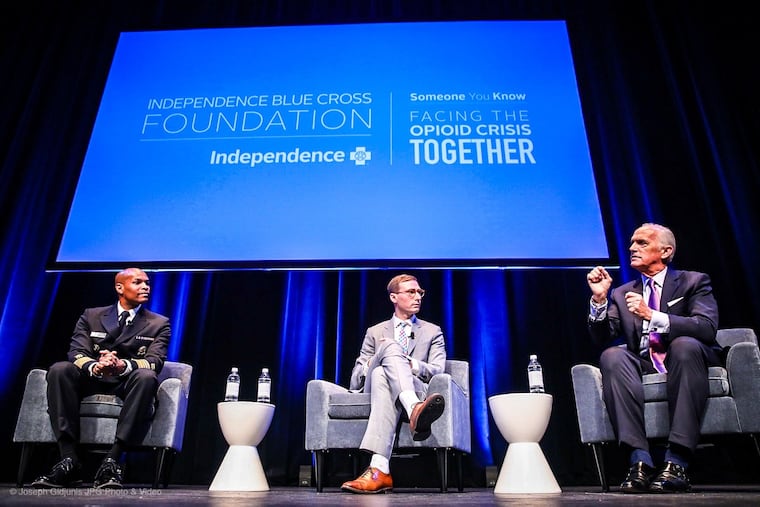In Philly, U.S. surgeon general reiterates qualms about supervised injection sites
Echoing an interview he gave last month at a recovery event in Philadelphia, Adams said the federal government should help quell the crisis by putting more resources toward measures more widely accepted by the public, such as needle exchanges.

Appearing at an Independence Blue Cross opioids forum in Philadelphia on Tuesday, U.S. Surgeon General Jerome Adams told a crowd of about 600 that his own life has typified the event's theme: the idea that most everyone knows a person affected by the opioid crisis.
Adams, an anesthesiologist by training, said he had been "part of the problem" — that he went to medical school when pharmaceutical representatives were pushing the false claim that opioids were not addictive, as long as they were being used to treat pain. And he knows firsthand the toll the opioid crisis has taken on families around the country: His younger brother is serving a 10-year state prison sentence for stealing $200 while in the throes of an opioid addiction, Adams said.
"It can happen to any of us," he said.
More recently, Adams was Indiana's health commissioner during the largest injection-drug-related HIV outbreak in U.S. history — an episode that led then-Gov. Mike Pence to temporarily lift a state ban on needle exchanges.
Still, the country's top health official, speaking on a panel moderated by Inquirer and Daily News health and science editor Charlotte Sutton, remains unconvinced that Philadelphia should implement a more controversial harm-reduction measure — supervised injection sites — to prevent fatal overdoses in a city where 1,217 people died from them last year.
Despite legal threats from federal authorities, advocates in Philadelphia are moving forward with plans to open a supervised injection site in the coming months and have incorporated a nonprofit, Safehouse, to raise funds and run the site.
Echoing an interview he gave last month at a recovery event in Philadelphia, Adams said the federal government should help quell the crisis by putting more resources toward measures more widely accepted by the public, such as needle exchanges.
"There's a lot of low-hanging fruit — evidence-based interventions that still need to be optimized," he said.
But Adams acknowledged after Tuesday's event that many Americans still need convincing on the necessity of needle exchanges. "Here's the thing about public policy: It has to be implemented in public and by the public," he said. "We have to be willing to go to communities and foster a conversation."
Indeed, during Indiana's HIV outbreak, Pence, who had previously said he was morally opposed to the idea of needle exchanges, lifted the state ban after weeks of increasingly urgent entreaties from health officials and advocates.
Adams was joined on Tuesday's panel by Dan Hilferty, chief executive officer of Independence Blue Cross, and Luke Gorman, cofounder of the Flock, a substance-use disorder support group at St. Joseph's University.
Gorman, who supports supervised injection sites, called the death toll in Philadelphia "astonishing" and said the sites are an "incredibly effective measure to save lives." (Hilferty said Blue Cross did not have a position on the sites: "It's not up to us to make a decision whether we're pro safe injection sites or vs. safe injection sites. We just want to create a web as a company connector to catch every single person we can and find that right path to true professional services.")
All three panelists stressed the importance of easing patients' access to treatment. "By getting someone into treatment early," Hilferty said, "costs go down. The up-front expenditure will mean less medical costs down the road."